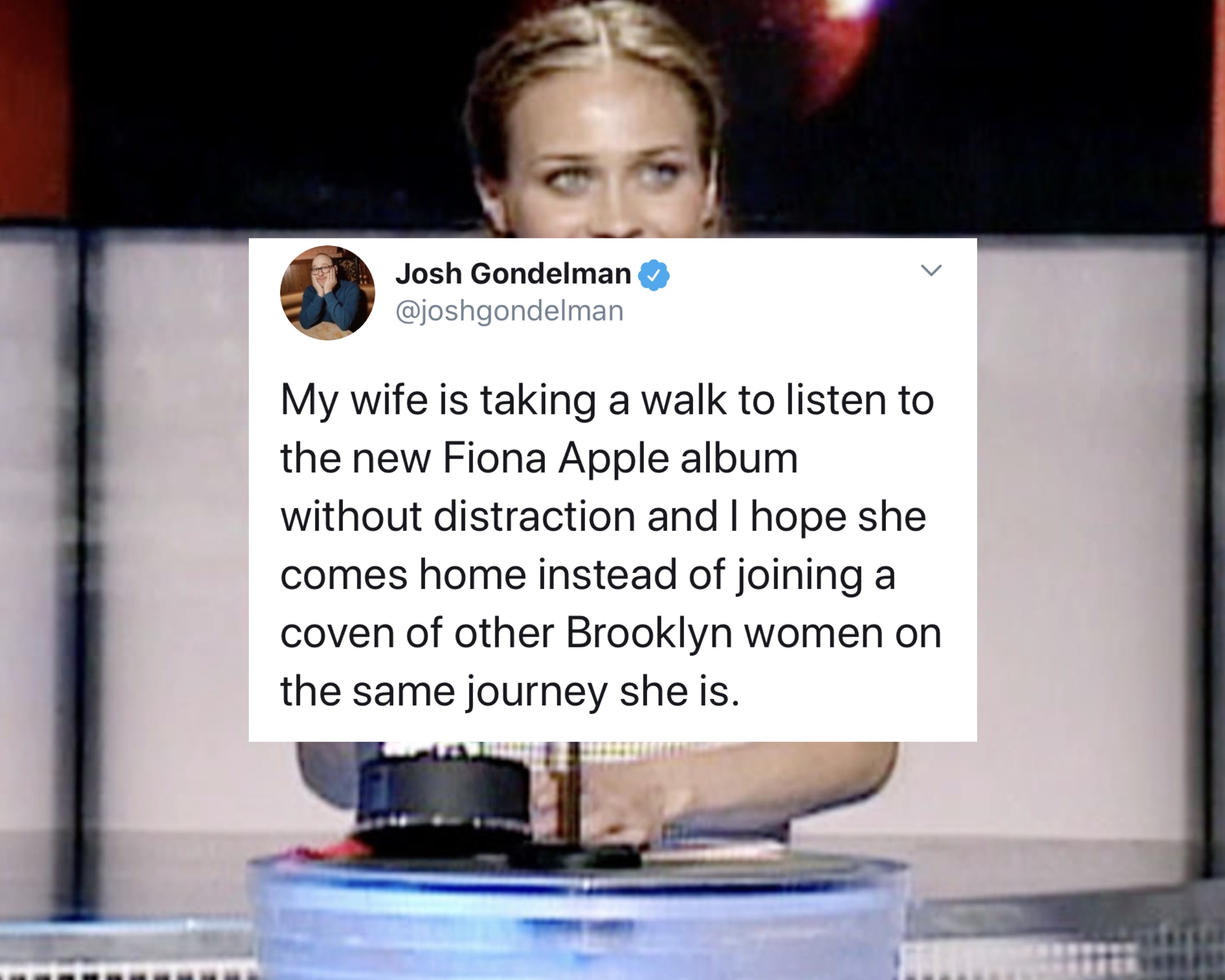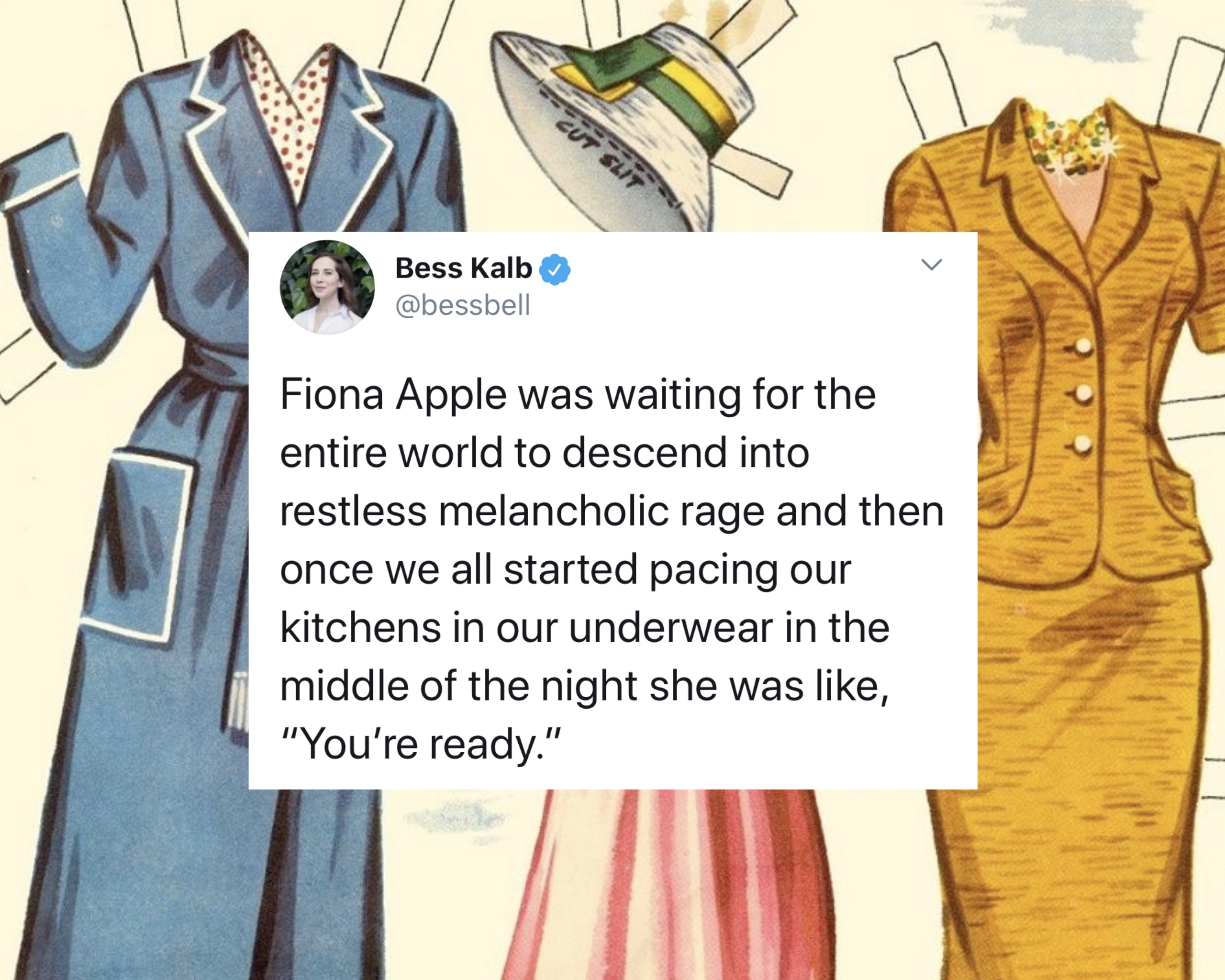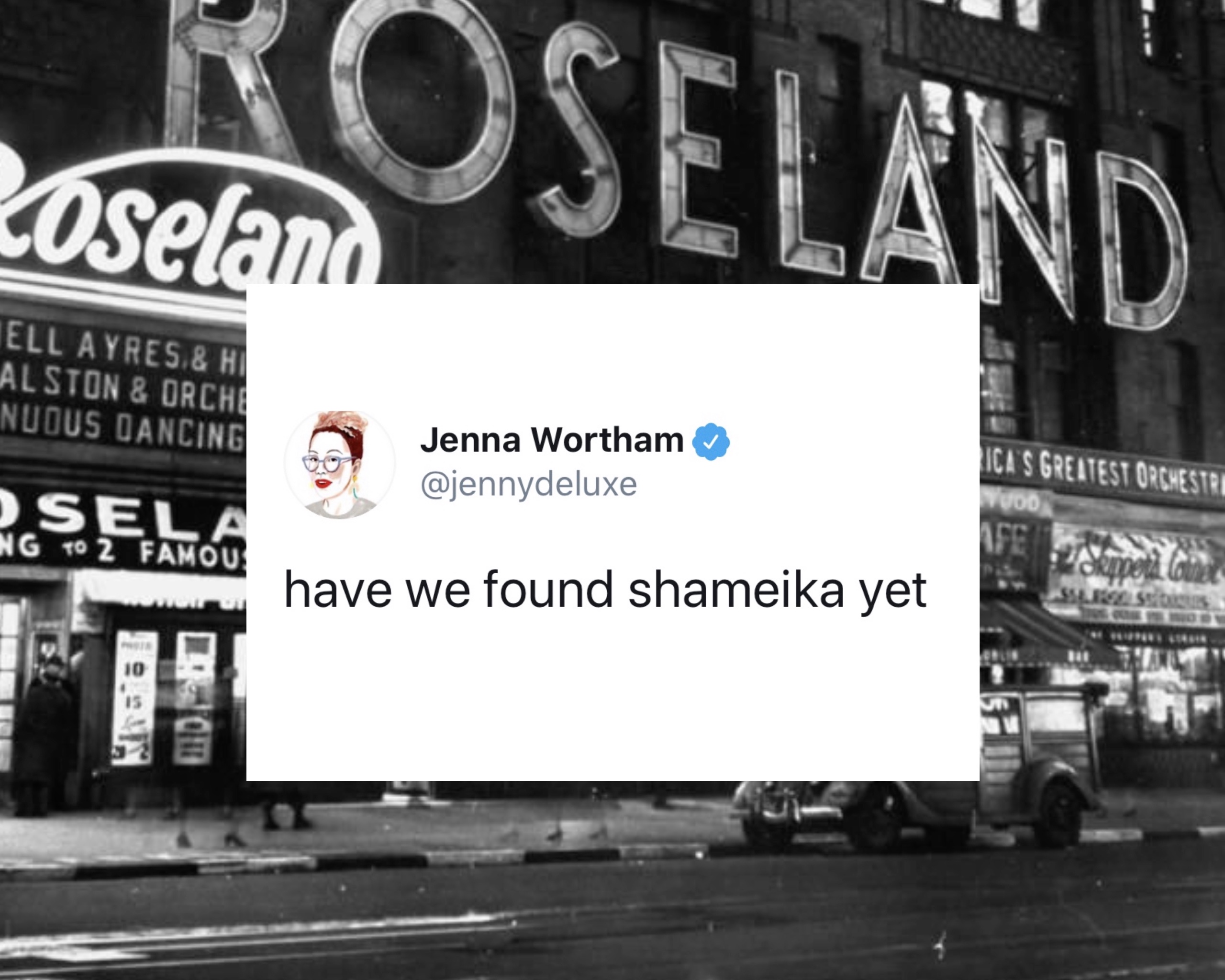I Don’t Know if I’m Coming Across, but I’m Really Trying:
On Fiona Apple & her Band of Quarantined Women
By Courtney Preiss
Illustration by Melissa Middleberg
I can count on one hand the number of times I’ve gotten sincerely excited about something in the nearly three months we’ve been quarantined. I’ve received a couple of joy-sparking book deliveries from my local indie, one of them including a debut novel penned by my best friend. I’ve been excited to join a weekly Zoom dance class on Saturdays, where I fly around my apartment like a Wallenda with the camera off and cry while doing high kicks to Sinatra’s rendition of “New York, New York.” My boyfriend, undeniably the more consummate culinary figure in our household, decided to use this time in isolation to master “beginner breads” using family recipes. “Excitement” is the only way to describe the sensation that accompanies each time he unveils a perfect piecrust or plucks a piece of naan off the cast iron.
But so far, only one COVID-era event has inspired me to leap out of my bed in the morning like a child courting the Christmas dawn: Fiona Apple released her fifth studio album after eight long years on Friday, April 17th. It is titled Fetch the Bolt Cutters—a borrowed line from an Irish television show that stars Gillian Anderson, but more hauntingly, a premonitive description of how one might feel as the effects of a month’s worth of pandemic isolation sets in. That is where I found myself in the run up to the album’s release and, perhaps, where you found yourself, too: holed up and oscillating between fear, exhaustion, rage, and acceptance.
For those who aren’t familiar, Apple has a reputation for eccentric antics that shadow her artistic renown. Her debut album made her a global phenomenon when she was still a teenager, particularly for the heroin chic music video that accompanied her single “Criminal”—a song Apple penned in forty-five minutes after her label told her the album was without a hit. Her approach to public relations was divisive. At the 1997 MTV Video Music Awards, she opened an acceptance speech by saying, “This world is bullshit,” imploring the audience to ignore what the industry deemed was cool and to go with themselves. At the turn of the century, she left her native New York for Los Angeles following an onstage meltdown at Roseland Ballroom and never looked back. A decade before he started chipping away at his own cultural credibility by wearing a red cap, Kanye West declared his desire to be “the Fiona Apple of hip-hop.” Her high-profile dating roster reads like a who’s who of Hollywood’s moodiest men.
It would be reductive to call her a recluse; she’s more Joni Mitchell than JD Salinger. She lives a private life in a small house on Venice Beach, she doesn’t do a ton of press or public appearances, and social media was never part of her lexicon (although, she does deploy digital transmissions from time to time on a fan-run Tumblr account called Fiona Apple Rocks). She famously makes her robust fandom wait a seemingly excruciating period between albums—her last, and my favorite, The Idler Wheel came out in June 2012—and their accompanying tours (although she’s been known to play LA’s tiny Largo on a somewhat regular basis). Considering the way she describes her existence to the few members of the press she is willing to let profile her, quarantine might not offer much of a deviation from Apple’s business as usual.

Image Courtesy of The Author
Maybe because she’s an expert in distancing, she was able to craft something that could speak to us so aptly in this impossible-to-anticipate phase of separation. After all, the refrain heard on the title track (“Fetch the bolt cutters / I’ve been in here too long”) seems like a set of lyrics die-cut for a nation stuck at home by state mandate. In “Heavy Balloon,” Apple welcomes a legion of depressed listeners beneath her fruit bat wings and lets us know immediately we are not alone in the sensations we drag through our existence. “People like us, we play with a heavy balloon,” the song opens, before launching into a proposed mode of comeback ripped straight out of a children’s gardening book: spreading wide like a strawberry plant, growing tall like a stalk of beans.
But Fiona Apple’s album is not worthy of its superlatives simply because it was released in ideal conditions for its consumption. The content of this album is remarkable for the same reason I was drawn to certain Beatles songs in my youth. Songs like “She Loves You” or “You’re Gonna Lose That Girl” that aren’t written to the romantic subject, but rather address the subject’s lover. This thought amused me as a child; listening to the songs on my yellow Sony Sports Walkman, imagining John and Paul serenading their male friends and trying to set them straight. Fiona pulls off her own iteration of this method with several of the tracks on Fetch the Bolt Cutters, readily doling out advice to women in a way we haven’t so directly heard from her perhaps since “Waltz (Better Than Fine)” off of 2005’s Extraordinary Machine, when she commanded us to celebrate datelessness and sit on the lawn and do nothing.
In “Newspaper,” Apple speaks from a distance to a woman with whom she shares an ex and wants to make her feel seen and understood, knowing they are each other’s sole witnesses—bound by the singular experience of loving someone who is bad to them. On “Ladies,” she invokes distortive visual effects to draw attention to how women, linked by a shared relationship to a certain man, are prone to warping the reality of each other’s narratives. She concedes that she likely won’t get through to the successors she’s addressing in the song, but, nevertheless, bequeaths to them whatever she leaves behind in his cabinets and a dress in the closet that actually belonged to an ex that predates her.
Both songs capture the fantasy of sympathetic camaraderie we’re prone to feel towards the people who now date the people we once loved or the people who loved them before us. They are a sonic careful scroll through the Instagram feed of an ex’s new partner (or, that of a partner’s ex) that no one is immune. They communicate both a desire to commiserate about an isolating experience and the impetus to warn someone they are in the familiar territory of harm’s way. “I don’t know if I’m coming across,” Apple pleads, citing the note pinned to the hand-me-down dress, “but I’m really trying.”

Image Courtesy of The Author
In a conversation with Emily Nussbaum for The New Yorker prior to the release of Fetch The Bolt Cutters, Apple mentioned a key source of inspiration for the album: the particular brand of inexpressible rage that engulfed a wide swath of American women (herself and myself included) following the Kavanaugh hearings in Fall of 2018—as we watched a redux of Anita Hill nearly thirty years after the original nightmare. “For Her” captures this era and this anger more acutely than any other song on the album—telling the story from a survivor’s perspective, based on a young woman who worked in the film industry and shared her experience with Fiona. The narrative is interspersed with tempo changes, word play, and, at one point, pays dark homage to Debbie Reynolds iconic “good morning” trill from Singin’ in the Rain. In addition to serving as a distillation of the album’s tone, I quickly came to see the title of the song as the work’s dedication as well.
The her in “For Her” is me, and my best friend, and my sister, and everyone within the de facto community of women concurrently needing and consuming and relating to this album.
The few songs that are directly addressed to men are defiant; laced with refusals to shut up (“Under the Table”) and confrontations about being used, like one overplucked guitar in a collection of many (“Rack of His”). But even a song that appears to have been inspired by a breakup is upon closer inspection inspired by a woman. The penultimate track, “Drumset” was—according to a conversation Apple had with Vulture—penned following a drunken argument with Aimee Aileen Wood, a member of her band.
My favorite song on the album is the rollicking and introspective, “Shameika.” While it is not written to a woman, it is written about a woman—or rather, a girl of Fiona’s youth who saw something in her and told her she had potential. Because Shameika was not a friend, and not known for being particularly complimentary, Fiona took the diagnosis to heart and allowed it to fortify her over the course of a lifetime. The song allows Fiona to hold hands with her younger self across the span of decades, underlining what holds true about who she is, who she has always been.
Lately, I see a common—and frankly, obvious—chorus splashed across social media, insinuating the virus is a shared storm but we are each in a different boat. The experience of quarantine—or the inability to quarantine—is heavily impacted by factors of race, gender, and socioeconomic status. I’ve found myself particularly haunted and compelled by the wide range of experiences held by different women throughout the pandemic: women living in active domestic violence situations, women who are preparing to give birth, women who are in recovery, women living alone, women who are performing the lion’s share of childcare while working from home. At a moment when we are losing the physical manifestations of community, women have come to rely on fragmented modes of virtual connection. The remote response to the release of Fetch the Bolt Cutters—the Twitter fanfare, the flurry of press, the lyrical dissection in my group threads—felt something like a small nod to community. An initial listen felt akin to a passed note in the age of the whisper network.

Image Courtesy of The Author
My gratitude to Fiona Apple is boundless. How often does it happen that the right thing is handed to you at the exact moment you need it? The only sentiment that can mirror the excitement of the morning I first heard Fetch the Bolt Cutters is the excitement that overtakes me in a moment when I intersect with someone who is yet to experience it. The album is meant to be passed with purpose like the items in the songs—a torch, a dress, a gift—contactless, from one to the next. The leader of a quiet army, she is keeping us in perfect company even if we’re weathering this storm alone. ︎